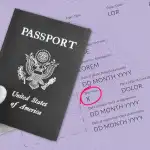A group of congressional Democrats is asking President Joe Biden on Tuesday to fulfill a campaign promise and use his executive authority to mandate the inclusion of a gender-neutral “X” marker on federal IDs.
“We believe that a gender-neutral marker (“X”) should be available on all federal IDs, and that accurate gender markers should be accessible using a self attestation standard,” a letter to Biden first reviewed by The 19th states.
“An executive order to this effect will ensure transgender, non-binary, and intersex individuals can obtain accurate and affirming documents without navigating discriminatory barriers,” continues the letter, led by Rep. Ro Khanna of California and Sens. Kirsten Gillibrand of New York and Tammy Baldwin of Wisconsin. They were joined by at least 20 other Democratic lawmakers.
The federal government currently requires gender markers on a variety of identification documents, including passports and Social Security cards, but in most instances only the “F” or “M” designation is available. Adding an “X” marker to these documents — and mandating that issuing agencies accept an individual’s self-attestation of gender, instead of having to provide medical documentation — would support individuals who “merely want to have their information accurately displayed on identifying documents,” the lawmakers write.
The Biden administration has already discussed using the president’s authority to add an “X” gender marker to federal documents with LGBTQ+ advocacy groups and civil liberties organizations, but in February declined to offer a timeline. Separately, the administration is waiting for the conclusion of a multi-year legal battle between Navy veteran Dana Zzyym and the State Department over the agency’s continued refusal to issue them an accurate passport with an “X” marker.
Khanna told The 19th in an interview that while he will re-introduce legislation to create a nonbinary option for federal IDs this Congress, and is awaiting the resolution of Zzyym’s case, an executive order would be the “simplest step” in the near term to ensure all Americans can have accurate identifying documents.
“We will try to codify it, but a good first step would be executive action,” Khanna said.
As of 2015, only 11 percent of transgender individuals in the United States had an accurate name and gender marker on all IDs and government records, the lawmakers’ letter states. Nineteen states and Washington, D.C., offer “X” gender markers on IDs.
New Hampshire is one of them. State Rep. Gerri Cannon, who in 2017 was one of the first two out transgender legislators elected in the state, worked to pass a bill after nonbinary individuals asked her to look into creating an “X” option for driver’s licenses. As one nonbinary person put it, according to Cannon: “I’m living a lie every day I hand someone my ID and it doesn’t reflect who I am.”
Cannon, who was once a truck driver, said that before her license was updated, she “always had to worry about whether someone was going to question the gender on my license.” Since New Hampshire’s law took effect in January 2020, about 75 people have used the “X” marker, she said.
Internationally, Argentina, Canada, India, New Zealand and Uruguay are among the countries that offer gender-neutral passports with an “X” option.
The Obama administration began allowing transgender people to update their passports after transitioning. Biden’s pledge to mandate the inclusion of an “X” marker would build on that legacy. He has also delivered on several other campaign promises to the LGBTQ+ community, including rolling back the transgender military ban and issuing an executive order to direct his administration to enforce a 2020 Supreme Court ruling extending the protections of the 1964 Civil Rights Act to LGBTQ+ workers. The Trump administration did not enforce it.
Khanna said, “It is dehumanizing that anytime someone who is transgender has to travel, they can’t even be identified with their own identity.”
He noted that when a president signs an executive order, even if it is followed by related legislation, it sends a message that “will be heard by the trans community, the LGBTQ+ community” and could also “inspire schools, faith leaders to have more inclusive policies.”
“It’s about whether we believe that the trans community should have equality as citizens, and about dignity, that’s ultimately what this is about and what the executive order would signify,” Khanna added.






